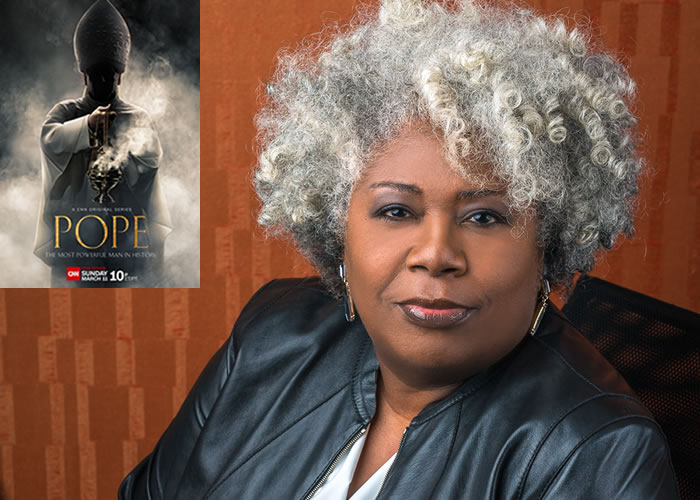Everything Old is New Again?
Solomon had it right. There is nothing new under the sun. What has been will be again, what has been done will be done again (Ecclesiastes 1:9).
One place where these words ring most true is within the Christian church. Even in 2018, you can compare, contrast, and learn from various events in Christian church history that appear today with slightly different twists and new characters.
As a historian, author, and Professor of Religious Studies and Africana Studies at the University of Pennsylvania, to say that Dr. Anthea Butler has seen a few instances of “nothing new in the church” would be an understatement.
We briefly caught up with Dr. Butler during press rounds for her contribution to CNN’s new original series, Pope: The Most Powerful Man in History, a six-part television event, premiering Sunday, March 11th, that goes inside the Vatican to reveal the power held by popes throughout the ages.
Interestingly, Dr. Butler shared parallels and teachable moments in the papacy and church history that the body of Christ can use today to make wiser choices and, perhaps, create a better “history” in the years to come for future generations.
Let’s take a look at a few lessons…
1. Don’t Sweat the Small Stuff.
When it comes to division within the Christian church throughout history and the struggle for unity in divided times, Dr. Butler’s recommendation is fairly simple: “Don’t sweat the small stuff. People fight in church all time about the little things…”
From the formation of thousands of Christian denominations to splits within today’s megachurches and storefronts, many issues that cause the church to “sweat” have more to do with the offended parties than God.
Self-check questions for lesson #1:
- Is God as, or more, offended than me in this situation? If not, why am I so bothered?
- Is my ego, bias, pride, or insecurities fueling division – or a substantive, Biblical standard?
2. Church Leaders are Human.
The secret’s out. Behind the bishop’s robe, the pastor’s pulpit and parking space, and the papacy ring – these important men are – men. Human. Every anointed, ordained, and powerful church leader who is held in the highest regard has to contend with the same human frailty, flaws, and shortcomings of, perhaps, the very ones they lead. However, they do so with a greater requirement of accountability (Luke 12:48).
Dr. Butler shares, “Everybody messes up. Even though you might be a Pastor or hold some big position in your church, you have to be accountable for that. The world is watching. With the world watching – and you get in trouble – bad things can happen.”
Consider that these “bad things” don’t stop at fallen church leaders’ public humiliation and ridicule. What about the impact on the adoring congregation? People who, with good intentions, yet in error, “worshipped” the “creature above the Creator”? The church can learn this important lesson from the lives of powerful church leaders throughout history: Keep man as man – let God be God.
Self-check questions for lesson #2:
- Have I held my bishop, pastor, or church leader in higher esteem than what is appropriate?
- Have I placed my bishop, pastor, or church leader before the Almighty God?
3. Behind Great Church Leaders are Unsung Champions.
In addition to the humanity of church leaders, no church leader – from the pope to pastors – rises to any realm of prominence alone. The development and success of local churches take more than the personality and presence of the church leader in charge.
The growth of most church communities rides on the backs of the often unsung champions – women.
Historically, with church leadership dominated by men, women represented the boots on the ground, faithfully working and supporting the vision of the leader.
Dr. Butler wrote about the extraordinary Women’s Department of the Church of God in Christ (COGIC) in her book, “Women in the Church of God in Christ: Making A Sanctified World“, and the contributions of those who were behind the scenes movers-and-shakers. “The women did the hard, everyday work, their men were in leadership. They are the organizers, they cook, they keep the men going…“, says Dr. Butler.
Self-check questions for lesson #3:
- Who is an unsung champion in my local church, working tirelessly for the church’s vision, that I can acknowledge or honor?
- As an “unsung champion”, how can I recruit, attract, and encourage others to rise to the call of the church to prevent burnout, fatigue, and health issues?
Like Dr. Butler says, yes, Christian church history is like a soap opera. There are so many stories in the Bible and in history books filled with joy and pain, good and evil.
What will you do with the life and times you read about in church history? Odds are, we’ll watch history repeat itself. But, when we take the tests over again – it’s an opportunity to score higher today than we did yesterday (2 Peter 1:5-8).




